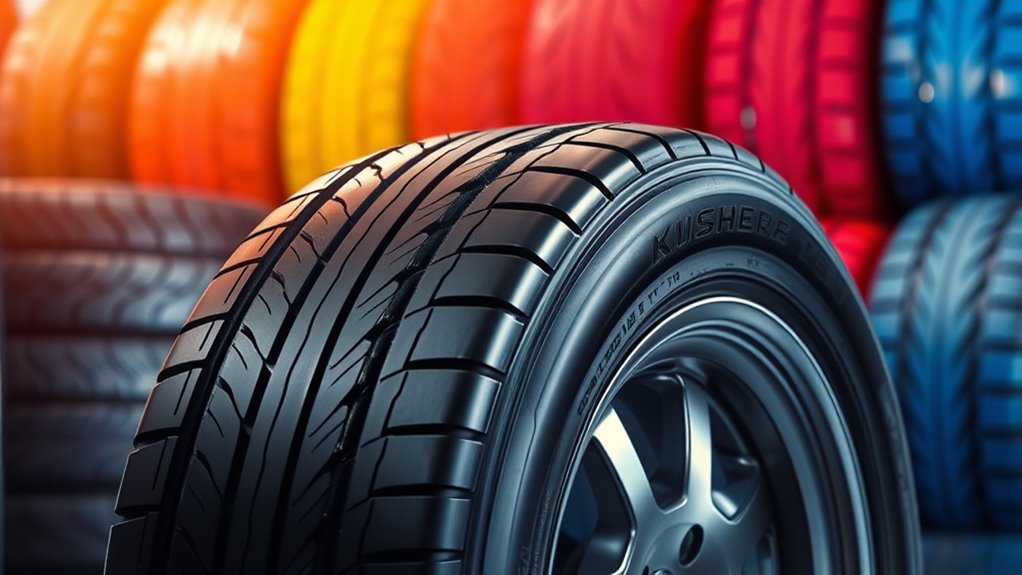Korean tire brands like Hankook and Kumho are leading the way in innovation and safety. They incorporate cutting-edge technology such as Hankook's iON tire, designed for electric vehicles, and rigorous quality control measures to guarantee superior performance. Compliance with strict safety standards further reinforces their commitment to quality. Plus, their focus on sustainability, including the use of recycled materials, sets them apart in the market. Discover more about their advancements and impact on the tire industry.
Key Takeaways
- Hankook Tire leads with innovative technologies like iON for EVs, enhancing performance and efficiency while reducing environmental impact.
- Safety standards are rigorously enforced in Korea, ensuring all tires meet KMVSS compliance for quality and reliability.
- Advanced features such as i Sound Absorber and i Super Mileage extend tire life and reduce cabin noise for enhanced user comfort.
- Investment in R&D drives the development of smart and airless tires, positioning Korean brands at the forefront of tire technology.
- Sustainability initiatives include using recycled materials and achieving significant carbon emissions reductions, reflecting a commitment to eco-friendly practices.
Overview of Korean Tire Brands
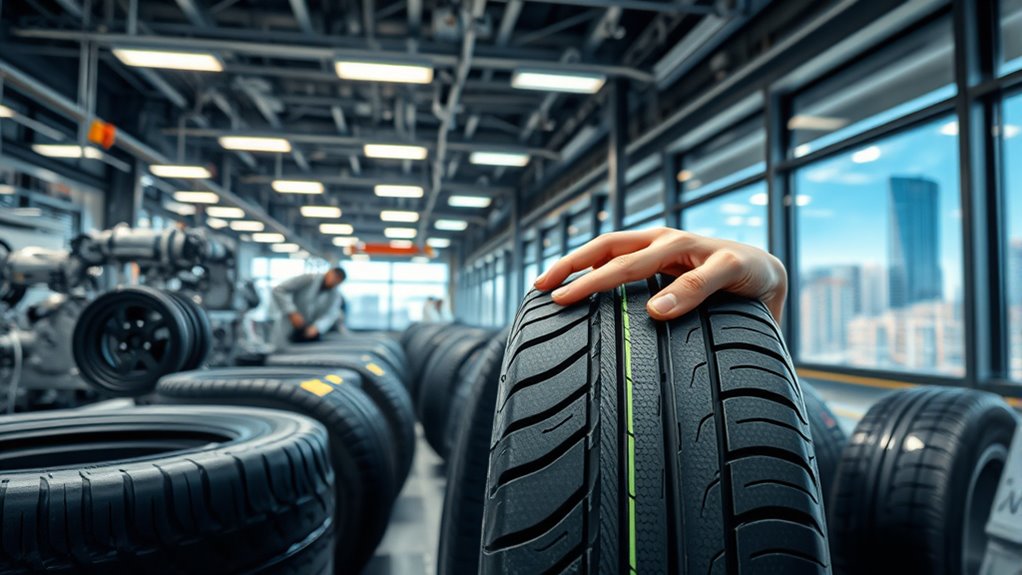
When you think about tire brands, Korean manufacturers stand out for their innovation and global reach.
Hankook Tire, founded in 1941, is South Korea's first tire company and a major player globally, holding about 38.8% of the domestic market. Korean tire brands have significantly improved product quality, offering performance comparable to higher-priced options. Additionally, these companies are known for their high refresh rates in tire technology, enhancing performance and safety on the road. Furthermore, these brands prioritize risk management strategies to ensure their products meet safety standards.
Hankook Tire, established in 1941, leads South Korea's tire industry with a significant 38.8% market share.
Kumho Tire, established in 1960, also boasts a strong presence, previously capturing around 48.3% of the market.
Nexen Tire, operating since 1942, has expanded internationally with advanced facilities.
Meanwhile, Daehan Tire Industries focuses on B2B sales of inner tubes, while Dongah Tire & Rubber specializes in various tire products, primarily for businesses.
Collectively, these brands contribute considerably to the growing demand for replacement tires and the export market, showcasing South Korea's pivotal role in the tire industry.
Innovation in Tire Technology
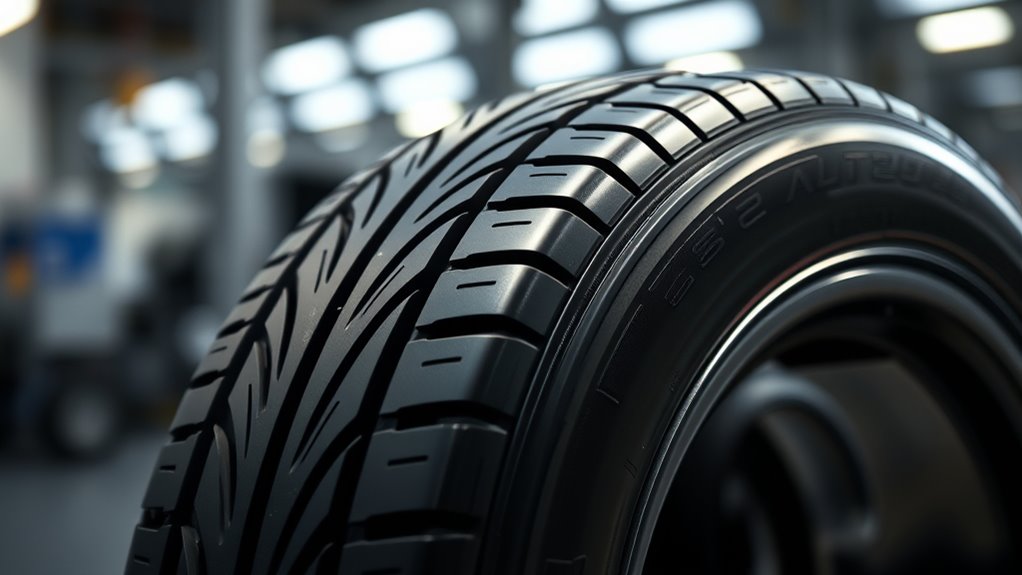
As the automotive industry evolves, tire manufacturers are at the forefront of innovation, particularly in response to the growing demand for electric vehicles (EVs).
Hankook's iON technology exemplifies this, offering EV-exclusive tires designed to enhance performance and efficiency. With features like the i Sound Absorber, you can enjoy reduced cabin noise by up to 18%. The i Super Mileage technology extends tire life by 15%, while i Perfect Grip enhances stability by 10%. Additionally, iON tires demonstrate up to 6% increase in MPGe efficiency for electric vehicles. Furthermore, advanced materials like the ProDurable and ProGrip compounds guarantee durability and improved traction. By integrating AI for quality control and exploring future mobility concepts, Korean tire brands are redefining the standards of tire technology and setting new benchmarks for sustainability and performance. This innovation aligns with the broader trend of renewable energy solutions that are crucial for reducing environmental impacts in various industries. Moreover, the commitment to privacy considerations ensures that user data is handled responsibly during the development of these technologies.
Safety and Quality Standards
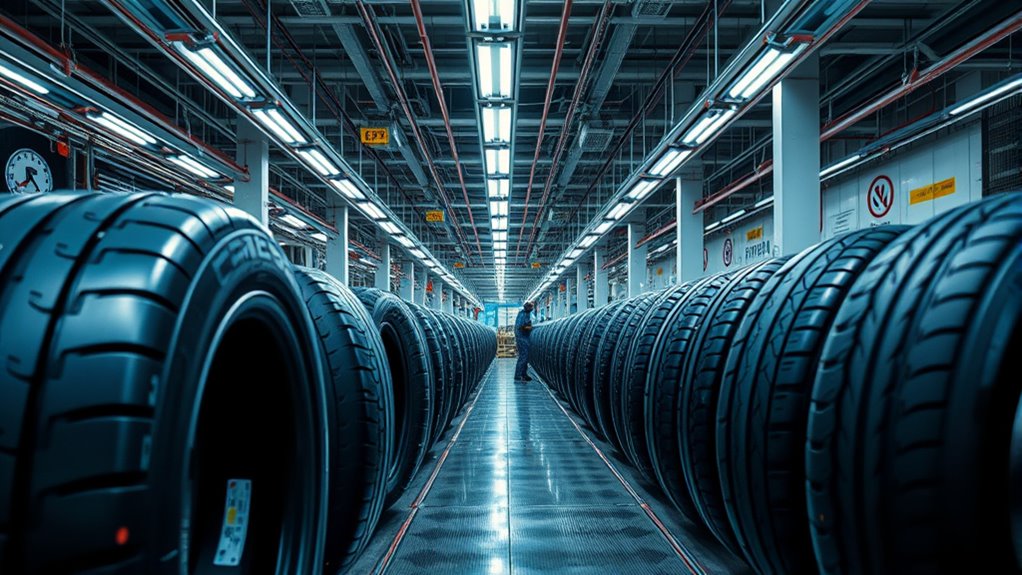
Safety and quality standards play an essential role in the tire manufacturing industry, guaranteeing that products not only meet regulatory requirements but also protect consumers.
In Korea, compliance with the Korean Motor Vehicle Safety Standards (KMVSS) is mandatory for all tires. These standards align with international regulations, facilitating global trade. The Ministry of Land, Infrastructure, and Transport (MOLIT) oversees their enforcement and regularly updates them to reflect advancements in automotive technology. Moreover, compliance with KMVSS ensures that tires contribute to overall vehicle safety through rigorous testing and certification processes that guarantee they meet strict safety criteria, contributing to overall vehicle safety. Additionally, these standards promote sustainable practices and environmental considerations, guaranteeing that the manufacturing process is both efficient and responsible. Innovations in renewable energy technologies are also being integrated into tire production, further enhancing sustainability efforts in the industry. Furthermore, adherence to safety standards helps prevent accidents and protects consumers, reinforcing the importance of quality in tire manufacturing.
This commitment to safety and quality protects you and your environment.
Market Strategy and Expansion
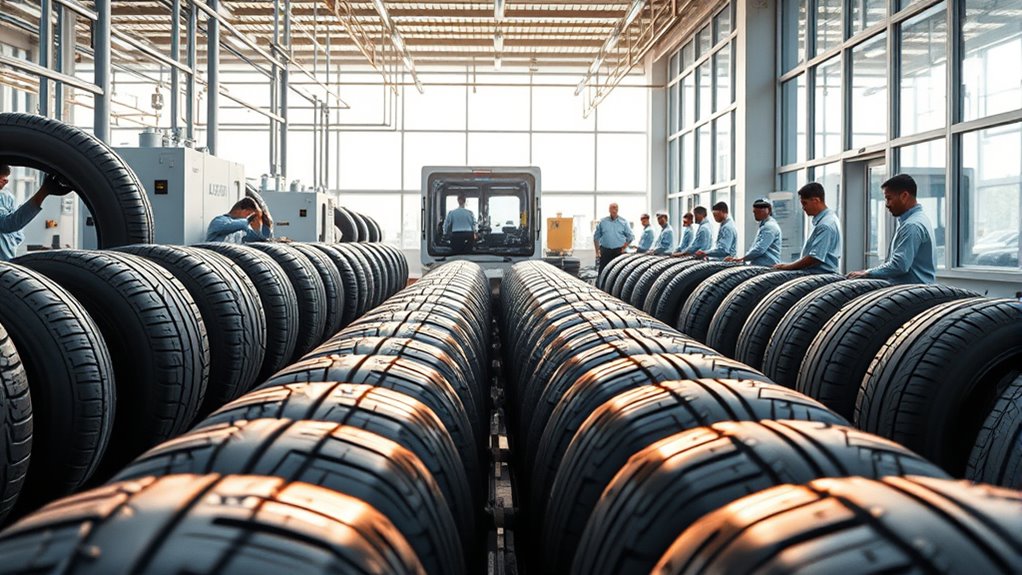
South Korea's tire manufacturers are strategically positioning themselves for growth in a rapidly evolving market.
To capitalize on emerging opportunities, they're focusing on several key strategies:
- Premium Tire Production: Brands like Kumho, Hankook, and Nexen are meeting the rising demand for premium and large tires, catering to the SUV and luxury sedan markets. In fact, Kumho Tire's operating profit growth reached 167% in Q1 compared to the previous year. Additionally, manufacturers are increasingly aware of the importance of understanding fee structures to maximize profit margins in their operations.
- Electric Vehicle Expansion: With South Korea's commitment to reducing carbon emissions, entering the EV tire segment presents a significant growth avenue.
- Technological Innovation: By investing in R&D, manufacturers are developing advanced tire solutions, such as airless and smart tires, to enhance their market competitiveness.
These strategies not only guarantee alignment with consumer preferences but also position them for sustained growth in the global tire market.
Sustainability and Eco-Innovation
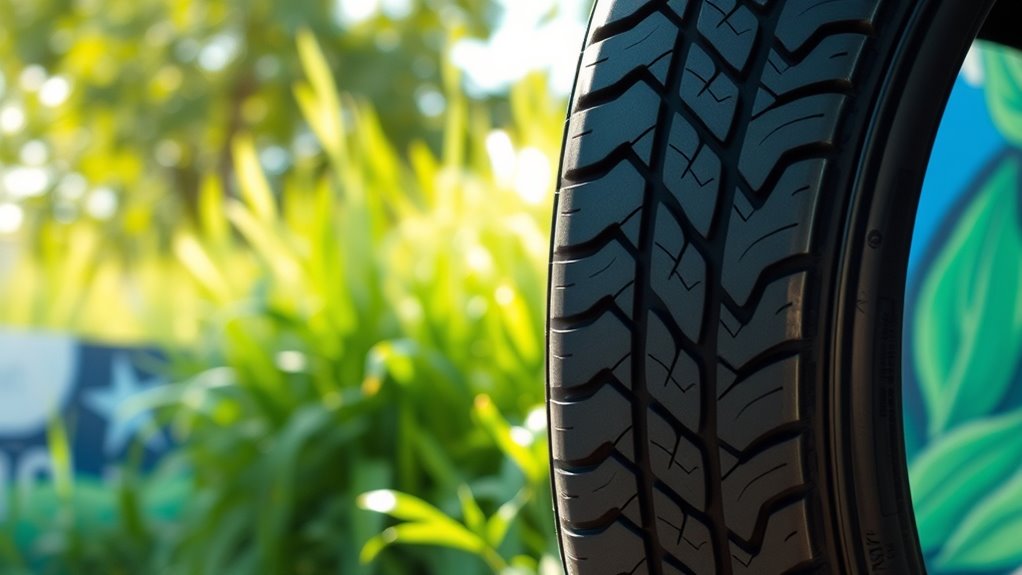
While the demand for sustainable practices grows, Korean tire brands are leading the way in eco-innovation. Companies like Hankook Tire and Hyosung Advanced Materials are revolutionizing production with chemically recycled PET, enhancing sustainability. Hankook's iON tire model boasts 45% sustainable materials, including bio-based and bio-circular polymers. They're also committed to reducing carbon emissions, targeting a 46.2% cut in Scope 1 and 2 emissions by 2030. This innovative tire is the first to feature the ISCC Plus certification logo, further proving its sustainable credentials. Additionally, air purifiers are gaining popularity for their ability to improve indoor air quality, which complements the sustainable practices of these tire brands.
Utilizing renewable energy and optimizing tire weight, they minimize environmental impact throughout the product lifecycle. As part of their commitment to sustainability, these brands are also focused on using solar energy in their production processes. With achievements like ISCC Plus certification, these brands exemplify their dedication to a circular economy.
Frequently Asked Questions
What Are the Most Popular Tire Models From Korean Brands?
If you're looking for popular tire models from Korean brands, you can't go wrong with Hankook's Ventus for performance, or Kumho's Ecsta, known for its grip and handling.
Nexen's N'Fera stands out for traction and durability.
For all-terrain needs, Hankook's Dynapro offers versatility, while Kumho's Crugen is perfect for SUVs, providing good fuel efficiency.
Each model is designed to meet specific driving demands while ensuring reliability and safety.
How Do Korean Tires Compare in Price to European Brands?
When you compare Korean tires to European brands, you'll notice that Korean tires generally offer more competitive pricing.
They often provide high-quality options at lower prices, making them appealing if you're budget-conscious.
While European brands may be seen as superior in quality, Korean brands are closing that gap.
With a wide variety of tire types available, you can find a suitable option without breaking the bank, especially in the premium segment.
Where Can I Buy Korean Tires Online?
Imagine cruising down the highway in a vintage muscle car, feeling the thrill of the road.
You can buy Korean tires online from various retailers. Check out The Tire Shop for Kumho tires, or visit Nexen Tire USA for their extensive catalog.
If you're looking for used options, platforms like KG Trading Corporation and TradeKorea have you covered.
Don't forget to explore local classifieds for even more deals on tires!
What Warranties Do Korean Tire Brands Offer?
When considering warranties from Korean tire brands, you'll find that Nexen offers a 6-year limited warranty and free replacement for defects within the first 1.6mm of tread.
In contrast, Kumho boasts an impressive 85,000-mile treadwear warranty and includes roadside assistance for two years.
Both brands exclude road hazards and improper use from coverage, so make sure to follow maintenance guidelines to keep your warranty valid.
Are Korean Tires Suitable for All Weather Conditions?
Imagine driving through a snowstorm, feeling confident thanks to your Hankook Weatherflex tires.
Yes, Korean tires are suitable for all weather conditions. They're designed to handle rain, snow, and heat, ensuring a safe driving experience year-round.
With features like 3PMSF certification for severe snow and optimized tread patterns for wet roads, you can trust their performance.
Conclusion
To summarize, Korean tire brands are like a well-oiled machine, driving innovation and safety in the automotive industry. Their commitment to cutting-edge technology and rigorous quality standards guarantees you can trust their products on the road. As they expand globally and embrace sustainable practices, these brands are not just keeping pace but leading the way. So, when you think of reliability and performance, remember that Korean tires are paving the way for a safer, greener future.
